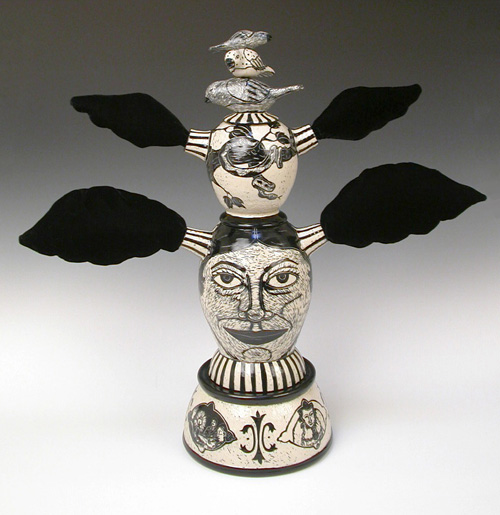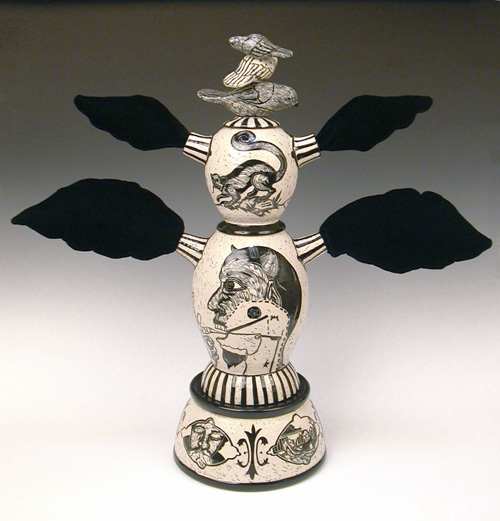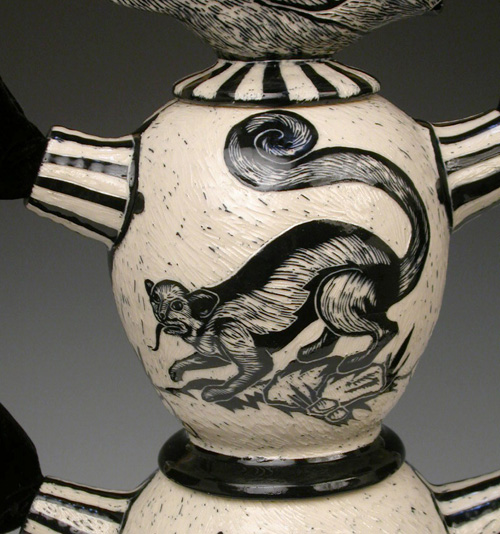Student Tristan Chappell, striking while the iron is hot (yes, this is what that expression actually refers to).
Ana Baranda, one of our favorite Penland students, will graduate from Warren Wilson College this semester with a degree in art and sociology. A native Angelena, Ana first came to Penland in 2008 on a scholarship from Heart of Los Angeles, to study repoussé with Marisela Gutierrez Campos. She’s since returned twice as a work study scholarship student, to study drawing and repoussé with Marisela again. On these visits, Ana fell in love with western North Carolina, and chose Warren Wilson, in nearby Swannanoa, for her undergraduate education.
Ana’s senior thesis exhibition was recently on view in Warren Wilson’s Elizabeth Holden Gallery, and featured a series of beautiful hand-sewn creations in repurposed textiles. Collectively titled Échale Ganas, these articles of clothing represent, in their materials, construction, and aesthetics, Ana’s investigation of her parents’ immigrant experience, particularly their relationships with traditional and industrial textile production.
Échale Ganas, repurposed uniform shirt, thread, brass plate
Échale Ganas 2, mesh shopping bage, lace vinyl placemats, thread
La Pareja (The Couple), mesh shopping bag, thread
Security Shirt (casual dress shirt), tortilla napkin, cotton bedspread, watercolor, thread
“When said in good spirits, the phrase Échale Ganas asks that we put our best efforts forward wherever we go. In times of extreme hardship, the phrase is used as a message of support for others. Regardless of whether or not the well-wishes are attuned to the needs of the receiver, the phrase exists as a form of encouragement to all who need it. This series is called Échale Ganas as a recollection of my parents’ first memories of living in the United States and Mexico and their relationship to textiles.
I found that my parents became connected to a textile industry in their youth as the found work in both Mexico and the United States. My mother learned to embroider through a lineage of women who made small items by hand in Mexico. My father’s first job in the States was at a sweatshop in Los Angeles, where he helped mass-produce a number of articles of clothing with the help of a sewing machine.
The objects that compose these mixed-media pieces are attractive to me because they were designed to be dispensable, and are able to be reproduced at a mass scale. They were found locally in western North Carolina and brought from Los Angeles. They were then altered by hand and hand-stitched with thread that originated from the same sweatshop my father worked for in Los Angeles.
By joining materials and imposing a process that is not traditionally reserved for the production of a uniform, I have almost rendered the piece free of any practical use. The material becomes estranged from its original function and the uniform deviates from its intended use. I invite the audience to wonder whether it’s possible to find beauty in the activities that must be embarked on for economic and cultural survival, and to think about where those activities currently exist.” — Ana Baranda
Congratulations, Ana! ¡Felicidades!
New for 2012, the Penland Gallery has opened an exhibit space primarily dedicated to single-artist exhibitions. Focusing on individual artists over the course of the year, this Focus Gallery will present a larger selection of their work to gallery visitors and patrons. The first Focus artist is Kathy King, a Boston-based ceramic sculptor and teacher, whose narrative ceramic installation Speak to Me will be on view from Friday, March 30 through Sunday, April 29.

“From childhood onward, human beings are taught to surround themselves with substances to consume and adorn themselves with. The need arose to create containers that not only provided a function but also amplified the experience of the user. From the attic vase to the 20th century novelty coffee mug, much about the societies that provided these vessels can be read from the images on the pots. Our ability to reference the ceramic object through the functional use, decorative beauty, or historical placement, confers strength upon ceramics as a powerful vehicle for commenting on contemporary, cultural issues.

In my work I use ceramic vessels, tiled furniture and printmaking, either separately or combined in installations, which present narratives from a woman’s point of view. My ideas are influenced by personal experience, and I often use myself as a character in the work. This presentation of personal narrative on ceramics through satirical humor, irony and sarcasm allows me to both celebrate and poke fun at my gender as well as myself. The combination of narrative presented on the surface, united with the contents or each vessel, allow a dialogue between function and narrative. Though each pot’s narrative may contain the equivalent of a one-line joke, when the pieces are considered together they convey a singular theme in a serial format.

I am interested in mapping the ways that popular culture – including comic books, magazines, television shows, films, and a host of other forms help to shape and change how our culture views women. Popular culture does not simply reflect women’s lives; it helps to create them and so demands critical scrutiny. My ultimate objective is to translate my own personal experience in relation to my culture, through narrative imagery on the utilitarian ceramic form. When I present these works in an installation, the stage is then set for my own epic tale of the struggles of mortals within our society. Though the urgency of these issues may range anywhere between morality to finding the right brand of cellulite cream, collectively, the human experience is recorded, as told through the voice of one woman.” — Kathy King
Click here to visit Kathy King’s website, where you can see more of her work.
Click here to visit the Penland Gallery website.
Click here for more information about Focus Gallery artists.